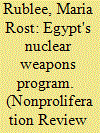|
|
|
Sort Order |
|
|
|
Items / Page
|
|
|
|
|
|
|
| Srl | Item |
| 1 |
ID:
108332


|
|
|
| 2 |
ID:
076717


|
|
|
|
|
| Publication |
2006.
|
| Summary/Abstract |
The Egyptian nuclear weapons program - started in 1960 and closed by 1973 - can lend insights into today's potential proliferators. First, a number of signs indicating that Cairo was pursing a nuclear option were present, giving us insight into what type of signs we might see from countries seeking nuclear weapons today. While indicators do not necessarily connote intent, my research shows that in the Egyptian case, these signs were indeed warnings that Cairo was seeking a military nuclear capability. Second, a number of external and internal factors combined to shut down the nuclear program, and fortunately, some of these external factors are still applicable today, giving us potential tools to use in persuading other states to forgo nuclear weapons.
|
|
|
|
|
|
|
|
|
|
|
|
|
|
|
|
| 3 |
ID:
189056


|
|
|
|
|
| Summary/Abstract |
When Egyptian president Anwar al-Sadat had the head of the Coptic Church, Pope Shenouda III, interned in a desert monastery for "sectarian sedition" in 1981, Copts in the diaspora mobilized. The Egyptian state subsequently demonized Coptic activists and enmeshed itself into the Church's transnational affairs, revealing how the Sadat regime circumscribed Egyptian citizenship, even for those abroad. Examining American court documents, Church records, and Coptic diaspora publications juxtaposed with Egyptian state media, this article surveys the role of diaspora activists in Cold War Egypt.
|
|
|
|
|
|
|
|
|
|
|
|
|
|
|
|
| 4 |
ID:
026866


|
|
|
|
|
| Publication |
London, Kensal Press, 1982.
|
| Description |
196p.Hbk
|
| Standard Number |
0946041008
|
|
|
|
|
|
|
|
|
|
|
|
Copies: C:1/I:0,R:0,Q:0
Circulation
| Accession# | Call# | Current Location | Status | Policy | Location |
| 022229 | 923.162/FER 022229 | Main | On Shelf | General | |
|
|
|
|
| 5 |
ID:
174123


|
|
|
|
|
| Summary/Abstract |
On November 19, 1977, the world watched in disbelief as Egyptian President Anwar el-Sadat visited Jerusalem. In one dramatic stroke, Sadat met with Israel's leaders, promised “no more war,” and offered Israel de facto recognition. Recently declassified archival sources provide new insight into why Sadat suddenly made all these concessions and why he chose to initiate conciliation through such a bold move. The historical evidence supports a prospect-theoretic explanation of Sadat's risk acceptance. Sadat never accepted Egypt's loss of the Sinai Peninsula but, unable to recover it either militarily or diplomatically (through U.S. mediation), he became willing to accept greater risks to recoup Egypt's territorial losses. As Sadat grew frustrated with the efforts of Jimmy Carter's administration to reconvene the Geneva Middle East Peace Conference, he sought to accelerate the peace process by abandoning multilateral diplomacy in favor of direct negotiations with Israel. He understood, however, that bilateral talks would fail given Israel's deep suspicion and mistrust of its Arab neighbors. By empathetically responding to its fears and security concerns, Sadat reasoned that he could reassure Israel of Egypt's benign intentions and remove, as he often said, the “psychological barriers” of the Arab-Israeli conflict. Such an approach might help Israel feel secure enough so that its leaders would trade land for peace.
|
|
|
|
|
|
|
|
|
|
|
|
|
|
|
|
| 6 |
ID:
183761


|
|
|
|
|
| Summary/Abstract |
From 1963 until 1975, Heineken, the Dutch brewing giant, was in dispute with the Egyptian government. The battle over compensation for the nationalization of the company’s assets in Egypt would become an international issue and a referendum on Egypt’s economic future. Although the two sides would eventually come to an agreement, the intense back and forth, preserved in Heineken’s company archives, sheds light on Egypt and its economy in a transitional period. This article, using unstudied archival material from Heineken, the Egyptian government, and local breweries, argues that the battle lays bare the roots of Egypt’s economic problems since the 1970s.
|
|
|
|
|
|
|
|
|
|
|
|
|
|
|
|
| 7 |
ID:
124809


|
|
|
|
|
| Publication |
2013.
|
| Summary/Abstract |
THE LONG YEARS of close and fruitful cooperation between the USSR and Egypt in various fields, which peaked out in the 1950s-1970s, might have formed a foundation for its further expansion also in the 21st century. It would make sense to understand the mistakes made during the past years which considerably undermined the trust between the two countries, in military cooperation above all.
On the night of July 23, 1952, Egyptian army units staged a coup against the King Farouk regime and took over power in the country.
The new young leaders inherited serious problems. Their prime task was to protect the country's sovereignty and security threatened by the presence of foreign troops - above all British troops - on its territory and control by Western states over the essential elements of Egypt's infrastructure, including the Suez Canal.
|
|
|
|
|
|
|
|
|
|
|
|
|
|
|
|
|
|
|
|
|